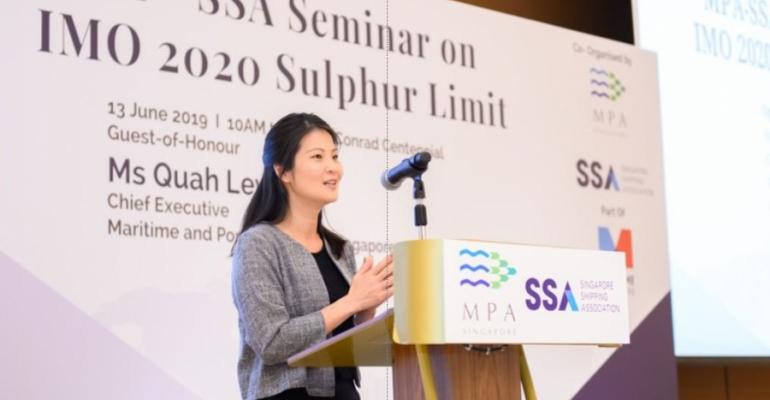Speaking at a Maritime & Port Authority of Singapore (MPA) and Singapore Shipping Association seminar on IMO 2020, Quah Ley Hoon, chief executive of the MPA said: “I am pleased to say that a few companies have shared with us that they are ready for the transition – BW Group, Maersk Tankers, Pacific Carriers Ltd, AET and PIL, have indicated that they are ready for IMO 2020.”
However, a completely full ballroom with an audience (pictured below), that had a large number of questions after two and half hours of presentations suggested that many owners and managers still have work to do, and concerns that need to be addressed, in regards to IMO 2020.

In terms of enforcing IMO 2020 regulations Quah said the MPA would be inspecting Singapore and foreign-registered ships calling Singapore. “Ships will be selected for inspection based on a risk matrix, which takes into account the compliance option of the vessel and whether a Fuel Oil Non-Availability Report (FONAR) has been submitted,” she said.
“Our inspectors will also be equipped with portable sulphur test kits for onsite fuel testing of in-use fuel. If necessary, we may send the fuel oil sample to the laboratory for detailed fuel oil analysis.”
On reports that the Singapore could levy fines of up SGD10,000 and jail terms of up to two years on shipowners and Master for non-compliance Goh Chung Hun, director (shipping) for MPA said that these were corrected, however, to the opportunity clarify that such penalities were not something new to IMO 2020.
Goh said that the punative measures were part of Singapore legislation passed in 2005 for Marpol Annex VI and were “not written just two months ago for IMO 2020”.
He also added for non-compliance, “In most cases you can end up with a port state control deficiency or detention.”
“But it’s not say it won’t end up in a fine.”
Copyright © 2024. All rights reserved. Seatrade, a trading name of Informa Markets (UK) Limited.
Add Seatrade Maritime News to your Google News feed.  |

